Russian of Old Believers
Name
Endonym
The endo-linguonym for the Russian language is русский язык. There is no special term for the dialects used in Poland. They are defined descriptively: русский говор старообрядцев, проживающих в Польше “Russian subdialect of the Old Believers living in Poland” (http://www.borovskold.ru/content.php?page=lonuemcd_rus&id=166). The community itself is defined as староверы, старообрядцы. There also exists the pejorative term раскольники, literally “schismatics”. The part of the Old Believers confession present in Poland is known as поморцы, “Pomortsy”, “the Pomorians”, or more generally as безпоповцы, “Bespopovtsy”, “the priest-less”. The latter term, which is a confession, defines all denominations with no clerical hierarchy.Exonyms
The language spoken by the Old Believers is defined as Russian. Similarly as in the case of endonyms, descriptive terms are used. One of Anna Zielińska's informants, an Old Believer of Masurian origin living in Hamburg, differentiated between the standard Russian language and Russian from the convent, referring to the Wojnów convent (Zielińska 1999 Zielińska 1999 / komentarz/comment/r /
Zielińska 1999 / komentarz/comment/r / Zielińska, Anna 1999. „Staroobrzędowcy w Hamburgu. Studium złożonej tożsamości”, Etnografia Polska 1/2: 101-120.
 ). English also lacks an established name for the language and uses descriptive terms, such as (Russian) Old Believers' dialect (Polish gwara Staroobrzędowców). The community itself is usually called (Russian) Old Believers, sometimes also Old Ritualists (Polish Staroobrzędowcy, Starowiercy). In Polish, the name of the Old Believers is spelt with a capital letter
because of regarding the community as ethno-confessional (see
Wicherkiewicz 2000: 190). The denomination with no clerical hierarchy is
defined as bezpopowcy, “the priest-less”.
). English also lacks an established name for the language and uses descriptive terms, such as (Russian) Old Believers' dialect (Polish gwara Staroobrzędowców). The community itself is usually called (Russian) Old Believers, sometimes also Old Ritualists (Polish Staroobrzędowcy, Starowiercy). In Polish, the name of the Old Believers is spelt with a capital letter
because of regarding the community as ethno-confessional (see
Wicherkiewicz 2000: 190). The denomination with no clerical hierarchy is
defined as bezpopowcy, “the priest-less”.The term Raskolniki (Polish raskolnicy) is also popular in English-language literature (Crummey 1998: 61)
 Crummey 1998 / komentarz/comment/r /
Crummey 1998 / komentarz/comment/r / Crummey, Robert O. 1998. “The Cultural Worlds of Andrei Borisov”, Forschungen zur osteuropäischen Geschichte 54: 57-81.
 .
.In German-language literature, there appears the term Philipponnen (Polish Filiponi) for the Old Believers from Masuria.
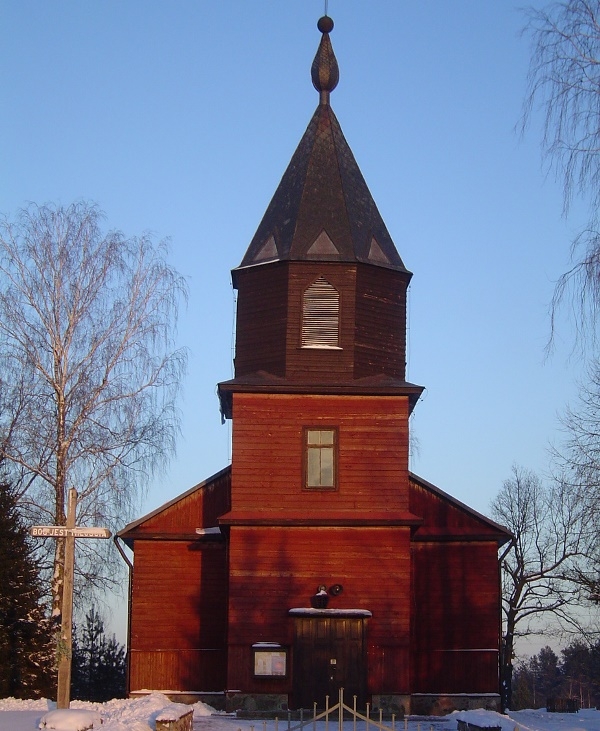
#tłum. podpis# Była molenna Staroobrzędowców - dziś kościół katolicki w Gibach, fot. T. Wicherkiewicz.
History and geopolitics
Church Slavonic and Old East Slavic (Old Russian) antiquities (such as Правда рѹсьскаѩ - Russkaya Pravda), in which characterisctic local components could be found, are frequently included in the heritage of the Russian language. The most important direct sources of the Old Pskov dialect,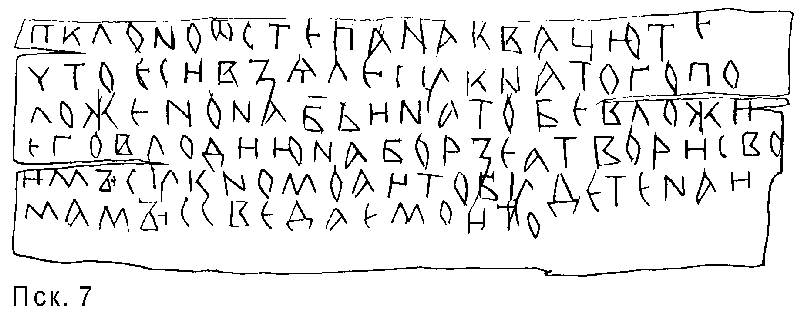
Birch bark manuscript Psk 7 (A letter from Stiepan to Waciuta) (as seen on: http://gramoty.ru/index.php?act=full&id=991).
from which the language varieties discussed here derive, are the Pskov birch bark manuscripts and notes in Orthodox Church books (Zalizniak 2004: 14
 Zalizniak 2004 / komentarz/comment/r /
Zalizniak 2004 / komentarz/comment/r / Зализняк, А. А. [Zalizniak] 2004. Древненовгородский диалект. Москва: Языки славянской культуры.
 ). There are also numerous indirect sources, such as Old East Slavic texts, in which characteristics of the Pskov dialect can be found (Zalizniak 2004: 14
). There are also numerous indirect sources, such as Old East Slavic texts, in which characteristics of the Pskov dialect can be found (Zalizniak 2004: 14 Zalizniak 2004 / komentarz/comment/r /
Zalizniak 2004 / komentarz/comment/r / Зализняк, А. А. [Zalizniak] 2004. Древненовгородский диалект. Москва: Языки славянской культуры.
 ; Witkowski 2011: 112
; Witkowski 2011: 112 Witkowski 2011 / komentarz/comment/r /
Witkowski 2011 / komentarz/comment/r / Witkowski, Wiesław 2011. „Język rosyjski”, w: Barbara Oczkowa & Elżbieta Szczepańska (red.) Słowiańskie języki literackie. Rys historyczny. Kraków: UJ, s. 111-126.
 ).
). Origins in Poland
The creation of a separate Old Believers community should be considered as caused by the reforms introduced by the Moscow patriarch Nikon to the Eastern Orthodox Church in the 17th century. The aim of these reforms was to bring the Eastern Orthodox Church closer to the Greek Orthodox Church. Those of the faithful who did not accept the changes were persecuted. They found shelter in remote areas of Russia and (usually only just) beyond its borders.The first records of Old Believer settlements in Poland date back to the end of the 18th century. The present settlements in the southern part of the Augustów County arose in the first half of the 19th century, while the beginning of colonisation in Masuria is dated at 1831. The Old Believers settled also in other regions which used to be part of Polish territory, like the Vilnius Region, the Grodno Region or Volhynia (Grek-Pabisowa 1997: 148
 Grek-Pabisowa 1997 / komentarz/comment/r /
Grek-Pabisowa 1997 / komentarz/comment/r / Grek-Pabisowa Iryda & Irena Maryniakowa 1972. „Teksty gwarowe rosyjskie”, w: Antonina Obrębska-Jabłońska (red.) Teksty gwarowe z Białostocczyzny z komentarzem językowym. Warszawa: PWN, s. 113-131.
 ).
Currently, the Old Believers live in Poland in the Suwałki-Sejny region, Augustów County#?-rejon?# and Masuria.
).
Currently, the Old Believers live in Poland in the Suwałki-Sejny region, Augustów County#?-rejon?# and Masuria.
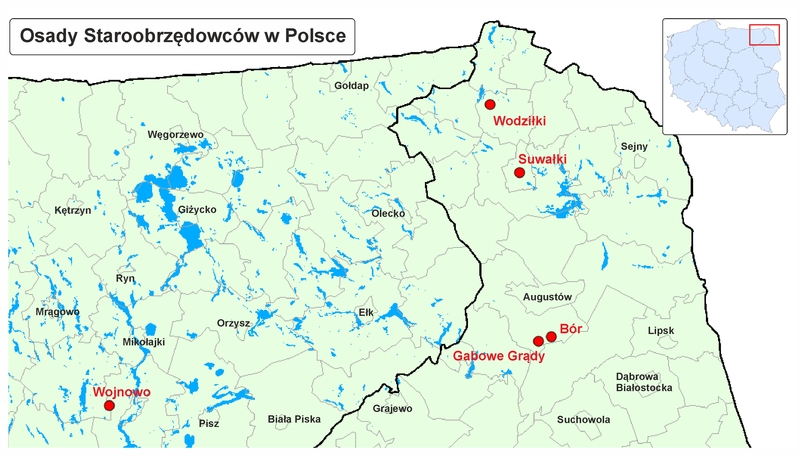
#tłum. podpisu#Osady staroobrzędowców w Polsce - map ed.: Jacek Cieślewicz.
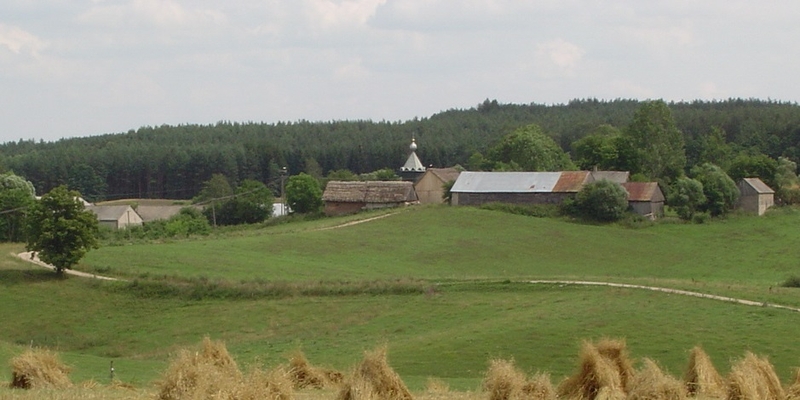
#illustration# Panorama of Wodziłki – an Old Believers' village in the Suwałki Region; a molenna dome visible in the middle of the village (photo T .Wicherkiewicz)
The doctrine of the Old Believers living in Poland assumes that since the introduction of the reforms, the world lacks true orthodox priests. The service is conducted by a nastavnik – a layman with a good knowledge of the religion, chosen by the parish. A nastavnik can receive education preparing him for the office at the Grebenščikova garīga skola in Riga, Latvia (Russian Гребенщиковское духовное училище, łot.#dodane# Grebenščikova garīga skola)
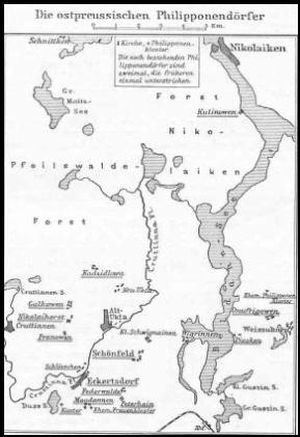
Old Believers' villages in Masuria at the beginning of the 20th century (as seen in: Tetzner 1902: 216
 Tetzner 1902 / komentarz/comment/r /
Tetzner 1902 / komentarz/comment/r / Tetzner, Franz 1902. Die Slawen in Deutschland. Braunschweig: Vieweg. [http://archive.org/details/dieslawenindeut00tetzgoog]
 ) – see more on http://philipponia.w.interia.pl/tetzner.htm. #dotłumaczyć#Odmianie językowej mazurskich Staroobrzędowców poświęcono# separate profile.
) – see more on http://philipponia.w.interia.pl/tetzner.htm. #dotłumaczyć#Odmianie językowej mazurskich Staroobrzędowców poświęcono# separate profile.Other locations
The variety of the Russian language spoken by the Old Believers from Masuria is used also by the community in Hamburg, Germany (Zielińska 1999 Zielińska 1999 / komentarz/comment/r /
Zielińska 1999 / komentarz/comment/r / Zielińska, Anna 1999. „Staroobrzędowcy w Hamburgu. Studium złożonej tożsamości”, Etnografia Polska 1/2: 101-120.
 ).
).The Old Believers living by the lake Peipus in Estonia use a subdialect deriving from the dialects of the Pskov type (Palikowa i Rostowa 2008: 11
 Palikowa i Rostowa 2008 / komentarz/comment/r /
Palikowa i Rostowa 2008 / komentarz/comment/r / Паликова, Оксана Н. & Ровнова Ольга Г. [Palikowa & Rownowa] 2008. Словарь говора староверов Эстонии. Тарту: Общество культуры и развития староверов Эстонии.
 ). The Old Believers of the Pomorian denomination live in other Baltic countries as well.
). The Old Believers of the Pomorian denomination live in other Baltic countries as well.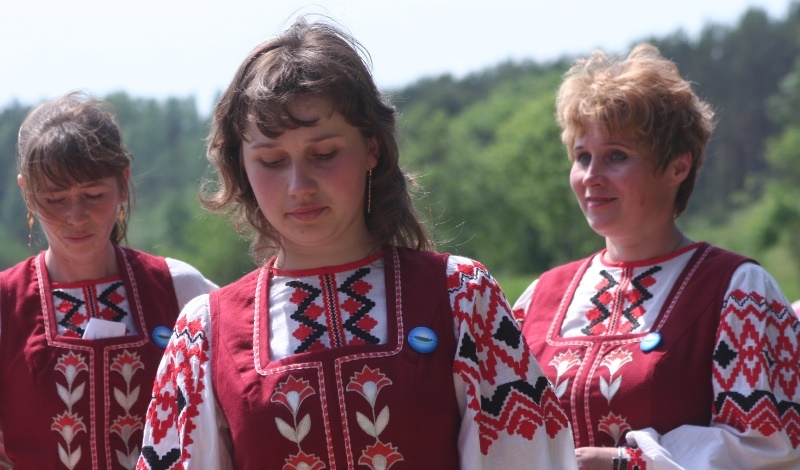
#tłum. podpisu#Starowierki (z Łotwy) w tradycyjnych strojach, fot. T. Wicherkiewicz.
Origin myths
In the region of Augustów, a legend of the Białomorzy is told; apart from that, there are no traditional stories about immigration that confirm Old Believers' Russian origins (Zielińska 1996: 46 Zielińska 1996 / komentarz/comment/r /
Zielińska 1996 / komentarz/comment/r / Zielińska, Anna 1996. Wielojęzyczność staroobrzędowców mieszkających w Polsce. Warszawa: Slawistyczny Ośrodek Wydawniczy.
 ).
).
ISO Code
| ISO 639-1 | ru |
| ISO 639-2 | rus |
| ISO 639-3 | rus |
| SIL | RUS |
- przyp01
- Zielińska 1999
- Wicherkiewicz 2000
- Crummey 1998
- Abramow i Abramowa 2009b
- Witkowski 2011
- Zalizniak 2004
- Grek-Pabisowa 1997
- Tetzner 1902
- Palikowa i Rostowa 2008
- Zielińska 1996
- Grek-Pabisowa i Maryniakowa 1972
- Sosna i Troc-Sosna 2002
- Kisin 2012
- Ledieniewa i Wojłowa [?]
- Gudaszewski i Chmielewski 2010
- Zielińska 1997
- Siatkowski 1983
- Głuszkowski 2011
- List of declarations 2012
- Abramow i Abramowa 2009a
- Grek-Pabisowa i Maryniakowa 1980
- Palikowa i Rownowa 2008
- Lewis 2009
- Rykała 2011
- zagrożenie języków / language endangerment
- Osady staroobrzędowców w Polsce
- Gramota na korze brzozowej
- Wsie Staroobrzędowców na Mazurach
- Półustaw - krój pisma cyrylicznego
- Wczesny tekst cyryliczny wydrukowany grażdanką
- Liczba osób wyznania staroobrzędowego
- Okładka słownika gwary polskich Staroobrzędowców
- Słownik dialektu Staroobrzędowców Estonii
- Tekst modlitwy 'Ojcze nasz'
- Tablica na Naczelnej Rady Staroobrzędowców
- Tablica informacyjna na molennie w Suwałkach
- Panorama Wodziłek
- Starowierki (z Łotwy) w tradycyjnych strojach
- Centrum wsi Wodziłki
- Księga liturgiczna Staroobrzedowców z Wojnowa
- Molenna w Gabowych Grądach
- Tradycyjny strój Starowierki
- Wiejska bania w Wodziłkach
- Współczesny nagrobek Staroobrzędowców w Wodziłkach
- Księga liturgiczna i modlitewne czotki
- Była molenna Staroobrzędowców w Gibach
- Molenna cmentarna w Suwałkach